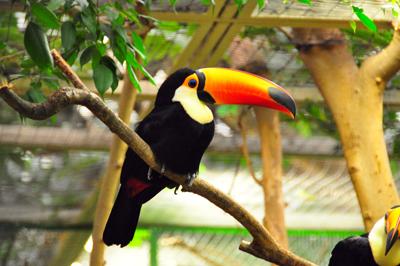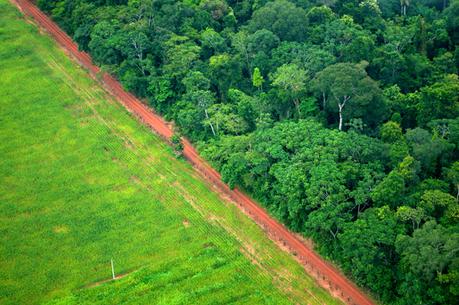GR: Biological conservation usually focuses on human benefits. Wild plants and animals only have value if they add to our wealth or convenience. This attitude might have been excusable a century ago when President Teddy Roosevelt initiated national conservation programs. Nature was so much greater than the deforestation, soil erosion, water pollution, and wildlife genocide that Roosevelt saw. Unfortunately, the homo-centric conservation Roosevelt and others instituted led to steady decline of life and Earth’s carrying capacity.
Too few people have realized that plants and animals have a right to exist independent of our needs. Accepting human equality with other species could have saved the Earth from the spreading pollution, devastating warming, and rapid species loss that we see today. Sadly, our species is controlled by its desires and fears and has never been able to forsee the consequences of our actions. Where is Klaatu? We’re running out of time.

The toco toucan is the largest species in the toucan family and inhabits many regions of South America. (Photo by Olaf Oliviero Riemer)
Down to Business
“The benefits of environmental conservation and restoration reach far and wide, and across all sectors. More businesses need to realize the positive effects biodiversity has on their bottom line—and more governments need to pass legislation that protects biodiversity.

An aerial shot shows the contrast between rain forest and deforested land in Brazil. (Photo courtesy of CIFOR)
“Visiting Brazil’s Atlantic forest last August—the second-most diverse ecosystem on the planet after the Amazon—I saw the impact of deforestation firsthand. In a habitat where 85 percent of the original forest has been cleared, a toucan stood out in the foliage due to its golden, oversized beak. This iconic bird is unusual not only because of its appearance, but also because it is well adapted to deforestation, preferring open land to dense jungle.
“Most plants and animals unfortunately do not have the same evolutionary advantage. The current rate of extinction across the planet is 1,000 times higher than the natural rate. The world is losing 150-200 species daily; in the time it takes you to read this, we will have lost one more.
“Conventional biodiversity arguments make the case for saving great beasts such as elephants and tigers because they inspire awe and contribute to healthy ecosystems. Biodiverse environments have better soil health, more stable climates, and greater resilience against natural disasters such as floods.
“But a growing body of scientific evidence and real-life examples points to yet another benefit: substantial economic value. In fact, biodiversity is critical to the sustainability of businesses around the world. If the biodiversity crisis continues unabated, for example, the food, commercial forestry, and ecotourism industries stand to lose a collective $338 billion a year.
“Biodiversity’s economic value starts at the dinner table. Fresh produce, in addition to being a vital part of our diet, yields $61 billion in annual sales. Without honeybees, this figure would be much lower. The hard-working pollinator is responsible for one of every three bites of we eat in the United States: We rely on honeybees to pollinate apples, oranges, almonds, and around a hundred other foods. But between 2015-16, 44 percent of honeybee colonies died. This raised prices for American-grown nuts, fruits, and vegetables. Our food supply shows that ecosystems are complex and interconnected; changes at one end have a cascade effect along the chain.” –Sofia Faruqi (More: The Business of Biodiversity | Stanford Social Innovation Review.)

